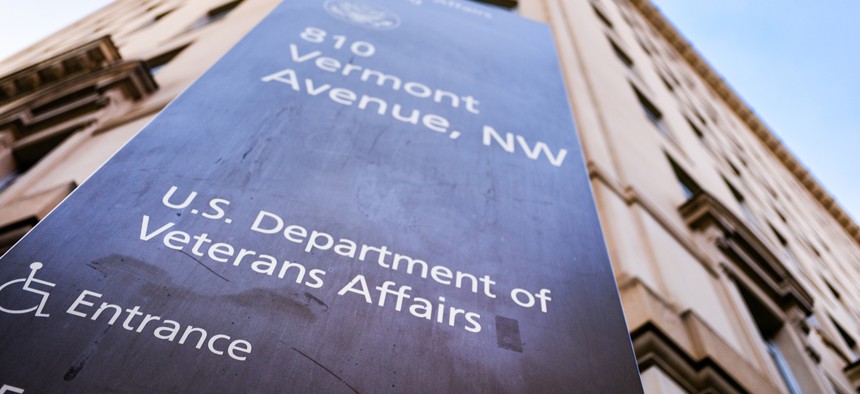
Lavingia worked for DOGE as a software engineer at the VA for just over 50 days, he wrote, but “was never able to get approval to ship anything to production that would actually improve American lives.” J. David Ake/Getty Images
VA-based DOGE associate gets ‘the boot’ after publicly discussing his work
Sahil Lavingia detailed in a personal blog how the reality of hunting inefficiencies at the Department of Veterans Affairs was not what he had expected.
A former associate of the Department of Government Efficiency says that he was removed from DOGE after an interview where he discussed his work was published earlier this month.
Sahil Lavingia — an engineer, tech startup founder and CEO of Gumroad, an e-commerce platform for content creators — wrote in a recent personal blog that he “got the boot” from DOGE without warning the day after Fast Company published an interview in which he spoke about finding less inefficiencies than he expected in the government during his DOGE assignment as senior advisor to the chief of staff at the Department of Veterans Affairs.
“I would say the culture shock is mostly a lot of meetings, not a lot of decisions,” Lavingia told Fast Company in the piece, which also noted that he noticed the number of mission-driven people working in government. “But honestly, it’s kind of fine—because the government works. It’s not as inefficient as I was expecting, to be honest. I was hoping for more easy wins.”
In the new post, Lavingia detailed his work extracting HR data to lay off employees at VA and working to implement artificial intelligence at the department as part of DOGE. The White House, Office of Management and Budget and VA didn’t respond to requests for comment.
President Donald Trump set up DOGE on his first day in office with a focus on tech. Since then, DOGE has also reviewed and cut government contracts at agencies and played a part in layoffs across the government — though Lavingia wrote that DOGE had no real authority there and the “real decisions came from the agency heads appointed by President Trump, who were wise to let DOGE act as the 'fall guy.'” DOGE associates have, however, led layoff efforts at several agencies before they got political heads.
Lavingia worked for DOGE as a software engineer at the VA for just over 50 days, he wrote, but “was never able to get approval to ship anything to production that would actually improve American lives,” despite building several prototypes.
“In the end, I learned a lot, and got to write some code for the federal government. For that, I'm grateful,” he said in his blog post. “But I'm also disappointed. I didn't make any progress on improving the UX of veterans' filing disability claims or automating/speeding up claims processing, like I had hoped to when I started.”
Lavingia did review contracts, using a large language model to flag some for potential cancellation, he wrote. He also said he built tools to help the VA with its layoff efforts, and generally worked to speed up AI at the agency, specifically via an internal ChatGPT tool and a VA chatbot demo for the public on the VA website.
Lavingia wrote that he wanted to work at DOGE to make an impact, noting that he previously canvassed for Bernie Sanders’ presidential run in 2016.
He previously applied for DOGE’s predecessor, the U.S. Digital Service, during the Obama administration, but discovered a difficult government hiring process, according to Fast Company. Government hiring has long been criticized for being arduous, and what was formerly U.S. Digital Service has done work to try and improve it.
The former member of Elon Musk’s team also wrote about frustration with a lack of knowledge-sharing in DOGE and what he called a lack of team culture. Lavingia said he pushed to open source his work when Musk asked about improving the public’s perception of DOGE during an all-hands meeting.
“The reality was setting in: DOGE was more like having McKinsey [management consulting] volunteers embedded in agencies rather than the revolutionary force I'd imagined,” the blog said. “It was Elon (in the White House), Steven Davis (coordinating), and everyone else scattered across agencies.”
This administration fired many who were already in USDS — which has acted as a type of internal tech consultancy for the government since 2014 — before it became DOGE. The General Services Administration has also since dismantled another of the government’s tech consultancy teams, 18F.
DOGE has been criticized for its work hoovering up government data, as well as its role in workforce layoffs, which have hurt some modernization efforts.
WIRED previously reported on the alarm bells Lavingia and his work set off for VA employees worried about DOGE’s lack of understanding of the agency and disregard for normal procedures.
“In meetings with the Office of the CTO, I discovered ambitious ongoing software projects like reducing veterans' benefits claims processing from 133 days to under a week,” wrote Lavingia. “I also learned that several of VA's code repos were already open-source, and the world's first electronic health record system, VistA, was built by VA employees over 40 years ago.”







